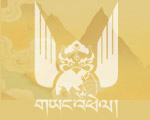 The nature of Bhutanese politics is particularly distinctive. On the one hand, the Kingdom is the only place to have retained the traditional institution of Buddhist monarchy. It is an independent territory where the locus of power is a sovereign individual. On the other hand, the prevailing regime appears to have been unusually successful, particularly when interpreted within a regional context. A well-functioning system receives unwavering popular support and has ensured the maintenance of good governance. Respective monarchs are widely considered to be "enlightened" rulers. A review of political history reveals a series of strong and influential decisions, which seem to curiously correspond to a collective national interest and have proved to be highly advantageous.
The nature of Bhutanese politics is particularly distinctive. On the one hand, the Kingdom is the only place to have retained the traditional institution of Buddhist monarchy. It is an independent territory where the locus of power is a sovereign individual. On the other hand, the prevailing regime appears to have been unusually successful, particularly when interpreted within a regional context. A well-functioning system receives unwavering popular support and has ensured the maintenance of good governance. Respective monarchs are widely considered to be "enlightened" rulers. A review of political history reveals a series of strong and influential decisions, which seem to curiously correspond to a collective national interest and have proved to be highly advantageous.
Bhutanese politics remains rooted in its recent pre-modern past. The prevailing political culture means that legitimate authority is divinely determined. The exercise of power is, therefore, both heavily centralized and, to an extent, beyond reproach. Broader relations assume a personal character, where an individual is judged on perceived loyalty to sovereign and nation. National politics coalesces around the monarch, whose traditional responsibilities focus on the maintenance of internal stability and the protection of territory and society from outside threats. This serves to both promote a united national position and a clear division between internal and external affairs.
Due to the country's small size and precarious location, foreign relations have always assumed prominence in domestic politics. The preservation of national sovereignty and independence in the context of inherent vulnerability is the fundamental political preoccupation. Indeed, the central goal of Bhutanese diplomacy has been to attempt to secure the nation's identity within wider regional and global environments. The country is surrounded by instabilities, most notably poverty and insurgency. The underlying issue of Nepali economic immigrants flowing across the porous southern border developed into an extremely damaging conflict in the late 1980s and early 1990s.
Providing the broad backdrop is the ongoing challenge of development and the associated risks of a failed project. Modernization poses political problems of an altogether different nature. Whereas more traditional security issues can be confronted from a united national front, modernizing processes easily traverse borders and can potentially undermine the coherent fabric of a nation. A fundamental reorientation of perspective is required, emphasizing an internal focus and the maintenance of stability and balance during a volatile period of domestic evolution. From a political viewpoint this implies both concomitant institutional reform and direct policy actions to stimulate change, mitigate potentially critical disequilibrium and guide the nation on a successful trajectory. The Bhutanese political system is undergoing a gradual series of modifications, which will eventually transform the structural setup and significantly alter the formal distribution of power.
If Bhutan is to make a successful transition, the state will have played a defining role. Indeed, the Royal Government remains the lead actor in the development process, and retains significant influence over how events might progress. The general attitude may be characterized as cautious, pragmatic and holistic, seeking to gradually accommodate change and effect steady evolution. Particularly assertive regulatory policies and an emphasis on self-sufficiency reflect the protective collective outlook that typifies other external relations. The overall policy approach is encapsulated in the concept of maximizing Gross National Happiness. This notion highlights the multidimensionality of development processes, and stresses the need to maintain a balance between respective elements within a unified system. Although its consistent articulation remains exceptionally complicated, there exist a host of individual examples of policy interventions that appear to correspond to such values. |



